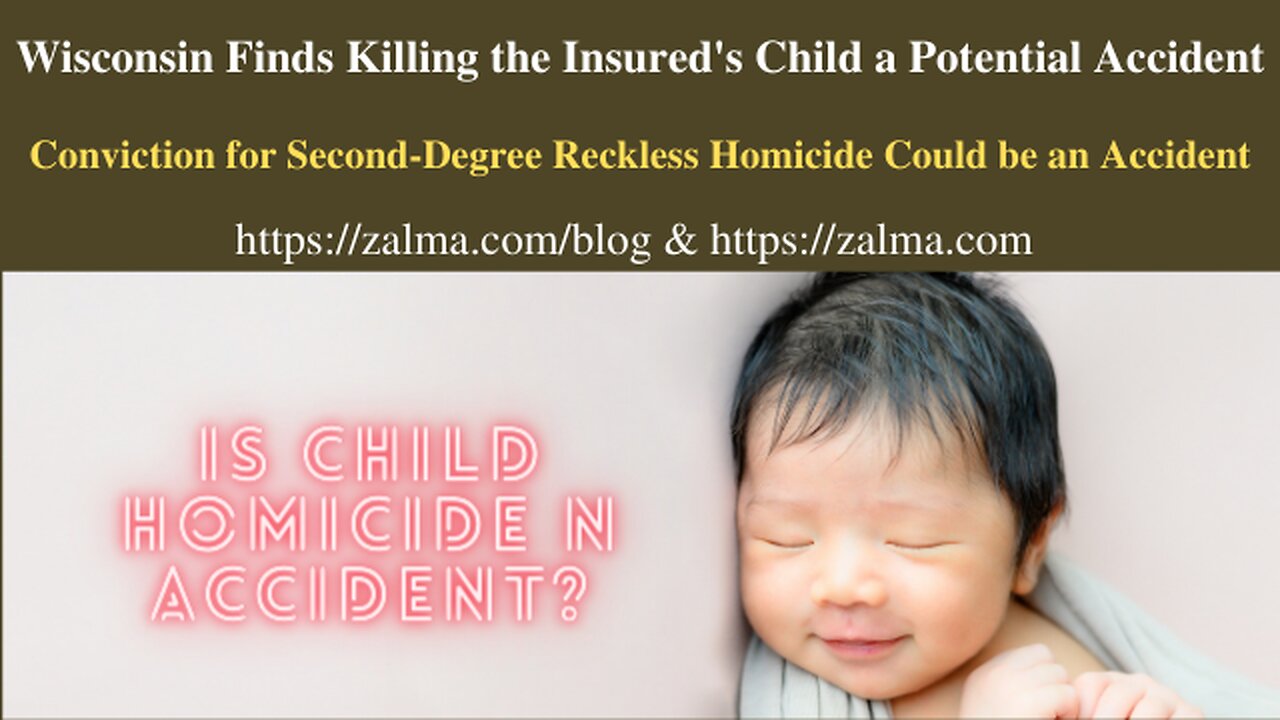Premium Only Content

Wisconsin Finds Killing the Insured's Child a Potential Accident
Conviction for Second-Degree Reckless Homicide Could be an Accident
When there is a severe injury, like the criminal death of a child, litigation results in an attempt to collect from an insurer since the convict will have little or no assets to pay for the loss.
In Lindsey Dostal, Individually and as Special Administrator of the Estate of Haeven Dostal v. Curtis Strand and ABC Insurance Company, State Farm Fire and Casualty Company, Intervening, No. 2020AP1943, 2023 WI 6, Supreme Court of Wisconsin (January 26, 2023) the Wisconsin Supreme Court was asked to allow the mother of the child to seek the criminal whose conduct - the father of the child - accidentally caused the death so that State Farm, the convicted father's insurer, must pay the mother for the loss of her child.
FACTS
Lindsey Dostal (Dostal) sought review of a court of appeals decision affirming the circuit court's grant of summary and declaratory judgment in favor of State Farm. The court of appeals determined that Curtis Strand's conduct did not constitute an "occurrence" covered by the State Farm policy at issue because his conviction for second-degree reckless homicide established that the death was not the result of an accident.
State Farm asserted that issue preclusion bars relitigation of the issue of whether Haeven's death was the result of an accident. It argued that Strand's criminal conviction is dispositive on the issue of available insurance coverage under Strand's policy, and that there is no coverage for Dostal's claims. State Farm further contends that the policy's resident relative and intentional acts exclusions preclude coverage.
Dostal gave birth to Haeven on April 3, 2017, and Strand was subsequently adjudicated the father. On July 11, 2017, Haeven passed away as a result of head trauma that occurred while she was in Strand's care. After a jury trial, at which Dostal was a witness, the jury convicted Strand of second-degree reckless homicide and resisting or obstructing an officer.
Dostal sued Strand for negligence and wrongful death. Strand tendered the matter to State Farm, his homeowner's insurer, seeking defense and indemnification.
State Farm argued that its policy did not provide coverage for Dostal's claims and that it thus had no duty to defend or indemnify Strand. State Farm asserted that there was no "occurrence" (defined as an "accident") triggering coverage. The circuit court agreed with State Farm and granted its motion for summary and declaratory judgment. The court of appeals affirmed the circuit court's decision in a published opinion. Dostal v. Strand, 2021 WI.App. 79, 399 Wis.2d 781, 967 N.W.2d 157.
ANALYSIS
The insurance policy in this case sets forth that coverage is provided for an "occurrence." An "occurrence," in turn, is defined under the policy as an "accident," which results in, as relevant here, "bodily injury."
The offense of second-degree reckless homicide requires that the actor creates an unreasonable and substantial risk of death or great bodily harm to another human being and the actor is aware of that risk.
RESIDENT RELATIVE EXCLUSION
State Farm contended that the resident relative exclusion applied to bar coverage here. In State Farm's view, Haeven was a "resident" of Strand's household as a matter of law. It points to facts in the record indicating that the paternity court had ordered Strand "frequent" physical placement of Haeven, that Strand physically cared for Haeven, and that Strand intended the duration of his relationship with Haeven to be substantial such that he would consider her when contracting about insurance.
However, contrary to State Farm's argument, in Dostal's deposition she testified that Haeven's "residency" with Strand was disputed. According to Dostal's deposition testimony, Strand only cared for Haeven without Dostal present four times, a count which includes two overnight stays. Dostal further testified that there was no formal schedule for placement and that Strand "was usually too busy or didn't have time for the baby or didn't want her over there." Given this testimony, the Supreme Court concluded that it could not conclude that Haeven was a resident relative of Strand as a matter of law.
The parties' submissions demonstrate that there are genuine issues of material fact as to the question of whether Haeven was a resident relative of Strand. Accordingly, summary judgment was inappropriate on this issue.
INTENTIONAL ACT EXCLUSION
If the conduct is intentional and if the conduct is substantially certain to cause injury, the Supreme Court could infer intent to injure only if the degree of certainty that the conduct will cause injury is sufficiently great to justify inferring intent to injure as a matter of law.
However, the Supreme Court cannot infer intent to injure as a matter of law merely because the insured's intentional act violated the criminal law. Conviction of a crime gives rise to an inference that an insured intended injury as a matter of law in two circumstances, but only: (1) if intent to injure is an element of the crime, and (2) if the crime in question involves the insured committing an intentional act that carries with it a substantial risk of injury or death.
However, intent is not an element of a reckless crime. Thus, if the intentional acts exclusion is to apply, the crime must involve the insured committing an intentional act that carries a substantial risk of injury or death. A determination that Strand's conduct was reckless does not preclude a finding that his conduct was an accident for purposes of insurance coverage.
In sum, the Supreme Court concluded that issue preclusion does not bar Dostal from seeking insurance coverage for her claims against Strand; the issue of whether Strand's conduct constituted an "accident" was not actually litigated in the prior criminal proceeding; and there are genuine issues of material fact regarding the application of the resident relative and intentional acts exclusions such that summary judgment is inappropriate.
THE DISSENT
Chief Justice Annette Kingsland Ziegler, and two other justices, dissented, because 12 jurors at Strand's criminal trial unanimously decided beyond a reasonable doubt that Haeven's death was not an "accident," and this precludes relitigating the issue of Strand's coverage. Strand's conviction for his act of reckless homicide, killing his own child ,Haeven, precludes Strand from claiming that Haeven's death was an accident. If the defendant did not act with an awareness required for this crime, he was not guilty of this crime. Since he was convicted by the unanimous vote of 12 jurors, he acted with the awareness required for the crime.
Strand's criminal trial is not binding any nonparties to that trial. The Chief Justice and two colleagues, concluded that the criminal trial "only binds Strand by precluding him from claiming that his criminally reckless act was a covered "accident" absolving him of liability to Dostal."
ZALMA OPINION
Since this is a decision reversing the granting of a motion for summary judgment it gives Dostal the right to attempt to bring sufficient evidence to a civil jury that convinces them that the death of Haeven was an accident and that she was not really in the house with her father as a resident relative. It will be difficult but since she only needs to convince nine of twelve jurors that the preponderance of the evidence contradicts the conviction of the crime found by a unanimous vote of a jury convicting Strand for the death of his child. The jury may feel sorry for the mother and punish Strand's insurer to help the mother. To me, the dissent is much more convincing than the decision of the majority.
(c) 2023 Barry Zalma & ClaimSchool, Inc.
Subscribe and receive videos limited to subscribers of Excellence in Claims Handling at locals.com https://zalmaoninsurance.locals.com/subscribe.
Go to substack at substack.com/refer/barryzalma Consider subscribing to my publications at substack at substack.com/refer/barryzalma
Barry Zalma, Esq., CFE, now limits his practice to service as an insurance consultant specializing in insurance coverage, insurance claims handling, insurance bad faith and insurance fraud almost equally for insurers and policyholders. He practiced law in California for more than 44 years as an insurance coverage and claims handling lawyer and more than 54 years in the insurance business. He is available at http://www.zalma.com and zalma@zalma.com
Write to Mr. Zalma at zalma@zalma.com; http://www.zalma.com; http://zalma.com/blog; daily articles are published at https://zalma.substack.com. Go to the podcast Zalma On Insurance at https://anchor.fm/barry-zalma; Follow Mr. Zalma on Twitter at https://twitter.com/bzalma; Go to Barry Zalma videos at Rumble.com at https://rumble.com/c/c-262921; Go to Barry Zalma on YouTube- https://www.youtube.com/channel/UCysiZklEtxZsSF9DfC0Expg; Go to the Insurance Claims Library – https://zalma.com/blog/insurance-claims-library
-
 8:36
8:36
Barry Zalma, Inc. on Insurance Law
1 year agoZalma's Insurance Fraud Letter - January 15, 2024
279 -
 1:25:17
1:25:17
FreshandFit
7 hours agoThe Truth About Investing In Crypto
63.3K4 -
 3:08:32
3:08:32
Barry Cunningham
7 hours agoPRESIDENT TRUMP MAKES A DEAL AT G7 | IRAN MIGHT BE TOAST | WEIRDNESS IN MINNESOTA CASE!
76.6K88 -
 2:47:07
2:47:07
Tundra Tactical
5 hours ago $2.20 earned🎯🔫 Defending Our Rights: Unpacking the Short ACT & Hearing Protection Act in HR 1 Draft! Live Now!
36.4K4 -

SpartakusLIVE
7 hours ago#1 Chicken Legs (FALSLY ACCUSED) Streamer bring YOU Monday MOTIVATION
69.1K2 -
 4:18:27
4:18:27
VapinGamers
5 hours ago $0.77 earnedMarvel Rivals - Rumblers Unite to Save the Galaxy and Demand a Tourney - !rumbot Beta Version
44.3K1 -
 26:57
26:57
Scary Mysteries
16 hours ago5 Most BIZARRE Clues Behind Real-Life Horror Stories
37.8K1 -
 8:13
8:13
The Shannon Joy Show
9 hours ago🚨 Trump’s Immigration U-Turn — Mass Amnesty, Political Chaos & MAGA Confusion
27.2K13 -
 5:00:16
5:00:16
Dragoon_B
9 hours agoDragoon - Siege X + Ninja Gaiden Ragebound DEMO + FNAF DEMO
17.1K -
 1:51:26
1:51:26
Glenn Greenwald
9 hours agoU.S. and Israel vs Iran: Repeating War on Iraq Scripts; Overwhelming Bipartisan Consensus for Israel's Wars | SYSTEM UPDATE #469
106K238